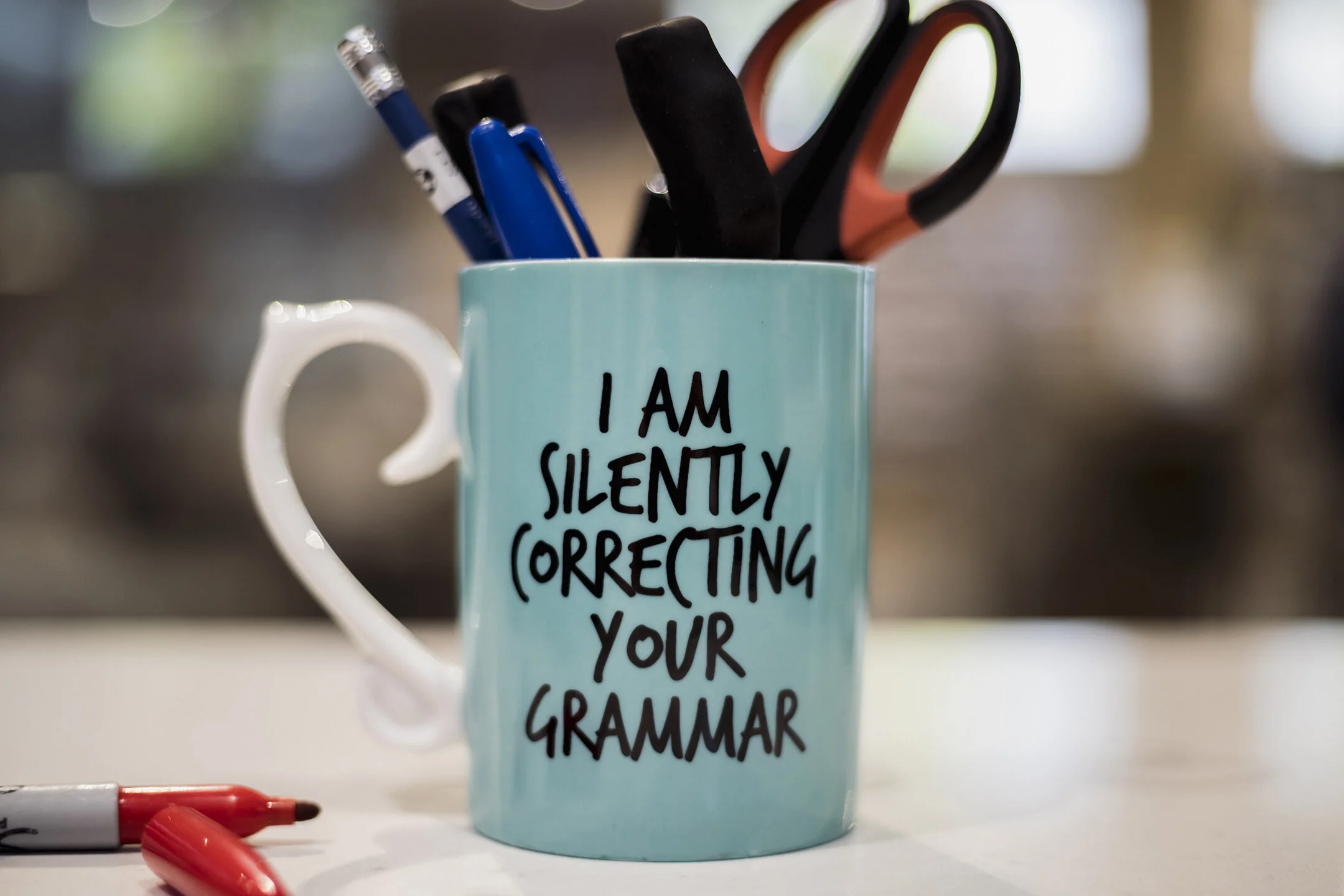Happy Grammar Day!
March 4th marks a day that brings me great joy: Grammar Day! So, don your t-shirts and raise your mugs with sayings that those of us with passion for good word usage find humorous!
I actually have t-shirts to prove dedication to grammatical gumption. My sister Patty gave me one that, like this mug, reads, “I am silently correcting your grammar.” I think it’s a riot—because good humor is based in solid truth. She and my other family members know this is a foundational truth for me, so much so that my sisters-in-law Lauren and Deb gave me another that reads, “I BEFORE E Unless you leisurely deceive eight feisty caffeinated foreign heirs to forfeit their heinous sovereign conceits.” It’s okay to guffaw along with me.
Unfortunately, some people don’t find my shirts or mugs funny, so I pretty much only wear them and drink out of them at home. They are literal “inside jokes.”
Whence comes this passion for grammar?
I trace my love of precise words back to my teachers.
As a child, my teachers were mostly nuns, and they were fanatical about using words correctly. Metal rulers, too. I came to appreciate their sentence-diagramming devotion when I took my required grammar course in graduate school. Thanks to Sister Colette and Sister Irene, I aced the weekly quizzes and the final exam, but this time without bruised knuckles.
However, it was my junior high English teacher, Mrs. Watson, who really instilled a love of words (and theater) in me. Her reading aloud Hamlet to our class remains one of life’s highlights in my mind’s eye. We sat in rapt attention as she played every role with dramatic voices and glorious gestures.
Mrs. Watson loved each student dearly, but woah unto those who confused a lot with allot! Fie! Fie! “Use the correct word and everyone will always know exactly what you mean!” Those words still guide me today.
Go to the Source
Friends often ask me how I remember all the rules of grammar and correct word usage. The secret is: I don’t. I always check myself and use excellent resources. These include:
The Chicago Manual of Style—especially section 5.250: Good usage vs. common usage
The Merriam-Webster Dictionary
The best punctuation book, period. by June Casagrande—Casagrande’s invaluable list in Part II is THE go-to for correct hyphenation and so much more.
When without my resources, I depend on a mnemonic or two for staying on the correct-word lane. Quite often, this involves rewriting the lyrics to songs. Back in the early episodes of the television comedy Cheers, the character Coach did this to remember information for his and Sam’s geography class. If you want a true gut-laugh, find the episode where Coach sings facts about Albania to the tune of “When the Saints Come Marching In.”
“What a Diff’rence an A Makes”
So here is my musical memory tug. The tune I’ve picked will be honored in its adapted title only. In 1959, the brilliant Dinah Washington recorded her Grammy Award-winning hit, “What a Diff’rence a Day Makes,” English lyrics by Stanley Adams (based on the Spanish lyrics by Maria Grever). My take is “What a Diff’rence an A Makes.”
The word pairs below challenge the best of us. They fall into my “tricky words” category, and I’ve listed several pairs in no particular order. The meanings of these words are determined by an A within one of the words.
As a side note, the quoted definitions below come from my favorite dictionary, the good old online Merriam-Webster. I highly recommend it!
affect vs effect
Affect is a verb. It means “to have an effect on something.”
Effect is a noun, and it means “something that follows; the result of a cause.”
My memory trick is to think of affect as an action (many verbs are action words), and action and affect both start with A.
My secondary memory trick is to think of the abbreviation of the film-term “special effects”: SFX. To my ear, the letter F sounds like it begins with a short E sound: ef.
accept vs except
Accept is a verb. It means “to receive something willingly.”
Except requires the word “for” to complete its meaning as a preposition: except for. Except for means “apart from” or “excluding.”
My memory trick is the same as above: accept is an action; accept and action start with A.
The secondary trick is thinking about how except begins with the X sound. An X is used to cross something out on a list. X it out = exclude it = except.
altar vs alter
Altar is a noun, and it is a table or table-like structure used in religious ceremonies.
Alter is a verb, and it means “to make something different.”
My memory trick is to think of how the “er” in verb is in alter.
My secondary trick is to fall back on my religious upbringing to make an association. We had an archbishop, so I think of how the first two letters, ar, are found in archbishop and in altar.
stationary vs stationery
Stationary is an adjective that means “fixed in a station; immobile.”
Stationery, depending on its use, is either a noun or an adjective. Either way, it has to do with writing supplies and writing paper.
My memory trick is to concentrate on the article “a” and think: if I’m stuck in a station, I am stationary.
My secondary trick is to consider the silent E at the end of the word “write.” Stationery builds on writing and the silent E keeps it straight in my head.
Share!
What words tend to trick you up? I’d love to hear your tricky word challenge and think up a mnemonic to help.
And if you don’t need help, you can always borrow one of my t-shirts.


